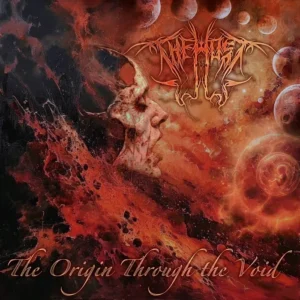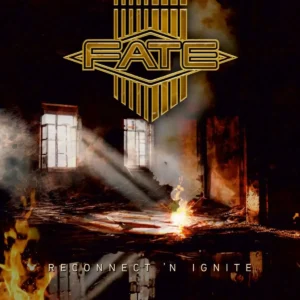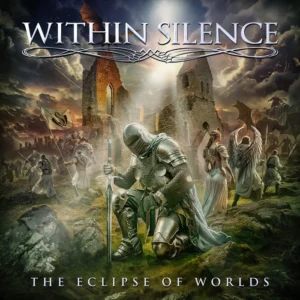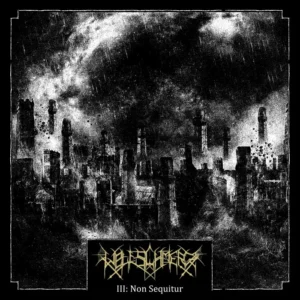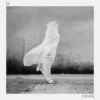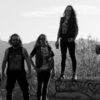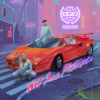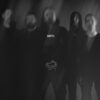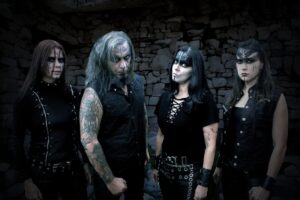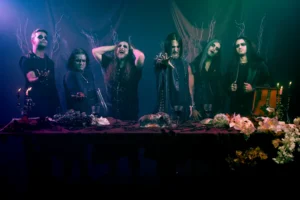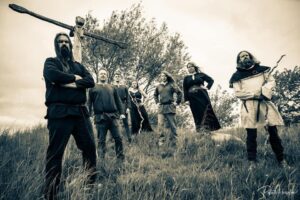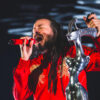Zoe Marie Federoff
Catalyst Crime
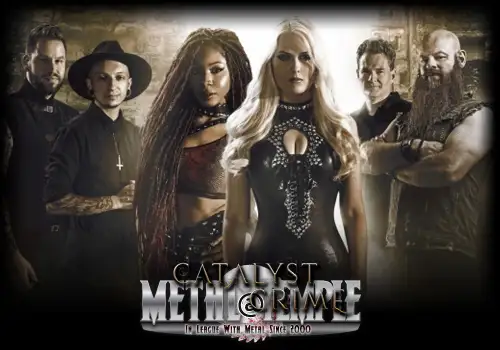
All in all, I can't complain these are still difficult times worldwide, and I am lucky enough to be holding my beautiful daughter and visiting my wonderful grandparents for the weekend as I type this. Things could be worse.
It really was a matter of perfect timing. Xandria (Gerit's band) went on a hiatus following the departure of their singer, Dianne Van Giersbergen, and my band Insatia broke up almost immediately after this. Gerit and I had been friends for a few years, and neither of us wanted to stop making music. Originally, I think we meant to keep this more of a project, but as time went on, it became apparent that Catalyst Crime should be a fully-fledged band.
I am a deeply spiritual person, and I can say the band is made up of very spiritual people from at times seemingly opposite sides of the spectrum. These strong convictions and personal searches for truth and meaning definitely come out in the music.
We created the music we wanted to create. There was no road map set out ahead of time, no predetermined formula for success we wanted to follow. We gave each song its own individual space in our minds, and sometimes it called for death metal elements, sometimes grooving prog, sometimes bombastic cinematic scoring. I think one of the best decisions we made was really to give Gerit full freedom to do literally whatever he wanted with the drums- he came up with some really brilliant and creative ideas that I feel surpass the "cookie cutter" drums a lot of symphonic metal bands have. It takes a lot of trust between musicians to give each other that freedom.
Besides Gerit and myself we immediately added Kaelen Sarakinis, and in fact I would call him the other co-founder of this band since he really brought life to this project with his initial ideas for guitars. The verse on "Condemn Me To Chaos", for example, ended up with more of a grooving guitar part than I could have ever imagined for it and it ended up working really well and adding more of a statement to that song than it might have had otherwise. The chemistry only got better from there once we added Jonah Weingarten (Pyramaze)- I don't even know how to explain how Jonah's brain works, how he can hear a demo and come up with a bombastic orchestral part immediately with what seems like no effort. His brain is off in another dimension most of the time, hearing melodies and harmonies the rest of us would probably spend days, even weeks searching for. Jonah was certainly a lucky find for us.
From there we replaced Tasha Reid on the album with Christopher Zoupa from Teramaze. Tasha was already working on a new chapter in her own life, so Chris stepped in as a studio guitarist and finished writing guitar parts that suited the album extremely well, and we are immensely grateful to him. Eventually we found a full-time guitarist in Chena Ohanele, and she's already working on some exciting new material for our next album, even though we found her after this first album was finished. As for bass, as many people know we brought my own father on board, although this was not the original plan! Our original bassist had a health issue and had to step down only one month before the studio was booked for album recording, so I asked my father if he would be considering writing and playing bass for the album. My dad is the person who originally got me into metal and took me to metal shows when I was a teenager- and he's a fantastic musician so I feel especially honored to be playing with the person who gave me the gift of metal in the first place. Altogether it's quite the collection of characters, personalities, and ideas, but we are really enjoying the experience.
I wrote this album to cover a wide spectrum of emotions because human beings are complicated and I prefer music that is equally complicated in the emotional sense, haha. Certainly, there are albums I enjoy that are all sad songs, or all uplifting songs, or all aggressive songs, but I set out to write about everything because I wanted people to use the album as a lens to examine their own experiences with. Our experiences vastly differ as human beings and yet somehow, they are not so different. So, love, anger, sorrow, determination, rage, hope, all of it is something you can feel on this album and I expect that wide range of emotions to continue on album 2.
I think people really have to find their own way out because one person's salvation road will never be exactly the same as another's. It's really horrible actually when someone says "I know how you feel and this is how you can fix everything!" Because honestly really no one knows what your journey is except for yourself. So, while I cannot offer a solution for everyone, I hope I have written something that helps you better understand yourself through the lens of this music.
The album was already completely finished right when the pandemic started, so the experience of living through this chapter in history didn't make it into these songs. The next album, however, definitely gets some of its flavors from the pandemic since we started writing almost as soon as we realized we would be stuck in our houses and hometowns for a very long time. I think you'll get some of the most unique music in history from many different artists in the next few years, since the entire world stopped working and we were all left to our own thoughts for months on end.
The phrase "Two things can be true" should really be "a billion things can be true." It is possible to hold nearly all emotions at once in a human mind, and to rapidly process them all in the space of days, or even hours or minutes. What's important is that we fully recognize everything in ourselves, instead of living with numbed out cognitive dissonance that we refuse to acknowledge.
For sure I am always growing as a writer and a vocalist and this album was the latest manifestation of what I've learned. I plan to never stop learning and developing.
Actually we had a lot of studio input from two of the guitarists, Thorsten Bauer and Chris Zoupa. Thorsten (Tosso) helped engineer quite a bit of the record, and he even helped record vocals and had a lot of input on how they should be approached. All the guitarists we involved contributed something really unique and special. The solo on "Mother Dearest" from Harri Hytönen is an impactful statement that I feel defines the song as much as the vocal lines or anything else does. The soulful solo from Bill Hudson on Chasing The Ghost ushers in a wave of emotions as climaxing last choruses come in. And the solo from Micki Richter on Cognitive Dissonance is adventurous, high energy, and adds some fun to an otherwise solemn theme.
We didn't meet Alex and agree that he should produce this band until after we had already started writing songs. But it was the best choice we could have made, involving his expertise and vision. Alexander Krull is a remarkable man and producer, and he took our finished sound to a whole new level with careful consideration and fresh ideas that we couldn't always hear for ourselves. Definitely we don't sound like Leaves' Eyes, but then really who does? Leaves' Eyes sounds like Leaves' Eyes, and they're brilliant at it so it would make no sense to try and model ourselves after their sound.
I think we draw inspiration from many great bands who came before us, but we aren't a carbon copy of any of them. (I find very few new bands are carbon copies of anything, although reviewers and fans try very hard to pigeonhole them with phrases like "the new Delain" or "just like Epica" or "trying to be Nightwish." While these statements can be flattering, pretty much none of your favorite new bands are trying to be copies or new versions of anything.)
Thank you for the kind words. Our main focus is always the vocal lines, because that's what people sing along with, that's what they hum along to. So, we have a rather unorthodox approach in that the vocals are always written first and we build the songs around them. I send vocals alone on a click track to keys and guitars, and it starts from there. Some things may be changed or modified to suit a new idea that keys or guitars have, but overall, we try really hard to preserve the "singability" of the songs.
Jonah is quite the prolific composer, and I really don't even understand half the time how he does it so fully and so quickly. He listens a lot to big film scores and composers like John Williams, Hans Zimmer, etc., and then he just starts weaving intricate orchestrals around the vocals I send him. I am so blessed to be working with such enthusiastic talent. He's definitely a staple in our sound.
I think we explored intense feelings with intense music, which is always the ultimate goal of metal.
We were really lucky to have it all done literally right as the pandemic was starting. The real challenge now is trying to play shows and get on the road. The times are still not good, and every band from the largest to the smallest is taking huge financial losses to try and get even a few shows together. It's stressful, and the industry needs the fans more than ever.
My feelings towards the album have changed since it's been done now for a year and a half. I'm still happy with it, but I think when it was first finished it was a good reflection of where I was at mentally in 2019 as opposed to where I am today. Now when I listen to it, I feel like I'm in a different mindset after this pandemic and the ensuing chaos. 2019 Zoe was a little less focused, a little more frantic, a bit more questioning, and 2021 Zoe hears that on the album and feels more collected, calmer, and more composed because the pandemic has taught me how to sit still. I think it'll be fun to listen
to this album back-to-back with the next one.
Really, I cannot say. I think we are all hoping for the best and preparing for the worst.
Thank you so much!

More results...



